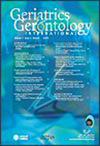Coronary heart disease as a risk factor for delirium in older COVID-19 patients
Abstract
Aim
Delirium during acute infection is associated with poor outcomes, although research is limited due to the heterogenous nature of affected populations. Identifying risk factors for delirium can help differentiate high-risk patients.
Methods
This retrospective study was carried out at a single COVID-19 designated hospital in Korea between February 2020 and May 2022. It analyzed the clinical and laboratory characteristics of COVID-19 patients aged ≥75 years. COVID-19, ranging from mild to severe, was diagnosed by polymerase chain reaction test, and delirium was diagnosed clinically. A binary logistic regression analysis was carried out using meaningful variables from descriptive analyses.
Results
Among the 1166 patients in the study population, 53 (4.5%) experienced delirium during the admission period. Patients with delirium were more likely to have been transferred from another hospital (24.5% vs. 12.4%, P = 0.018) and had higher body temperatures (37.4°C vs 37.1°C, P = 0.008). They also had a history of coronary heart disease, chronic kidney disease more frequently and showed higher C-reactive protein (19.2% vs 7.1%, P = 0.003; 13.5% vs 4.5%, P = 0.009; 6.2 mg/dL vs 4.8 mg/dL, P = 0.026). Patients with delirium more frequently required oxygen support, mechanical ventilation and transfer to a higher-level hospital (54.7% vs 35.7%, P = 0.008; 13.2% vs 4.1%, P = 0.006; 17.0% vs 7.0%, P < 0.001). Coronary heart disease was associated with a significantly higher odds ratio of 2.898 (95% confidence interval 1.118–6.696, P = 0.0182) in a multiple regression model.
Conclusion
A history of coronary heart disease was associated with a high risk of developing delirium during hospitalization for COVID-19 in patients aged ≥75 years. Patients with delirium experienced worse COVID-19-related outcomes. Geriatr Gerontol Int 2025; 25: 560–564.


 求助内容:
求助内容: 应助结果提醒方式:
应助结果提醒方式:


